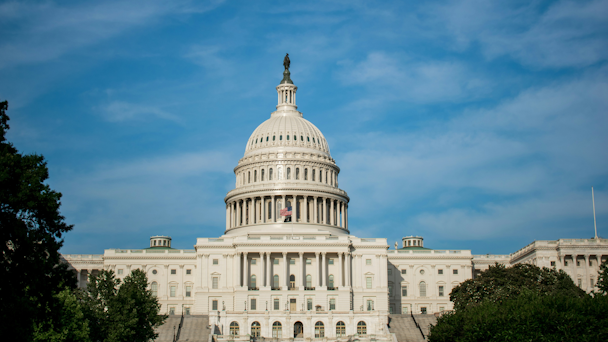Advertisers on alert as bill to ban TikTok or force divestment advances in US House
The Chinese-owned app is facing renewed pressure from US lawmakers over national security concerns. The development, experts say, should act as a warning sign for advertisers and creators.

TikTok is facing the possibility of a nationwide ban in the US under a new proposed bill / Elijah Mears
A new attempt to hamstring TikTok in the US is gaining momentum.
On Thursday, the US House Committee on Energy and Commerce unanimously approved a new bill that would require TikTok’s Chinese parent company, ByteDance, to divest from the popular video-sharing app within six months or face a wholesale ban in the US.
The proposed legislation, the Protecting Americans from Foreign Adversary Controlled Applications Act, would hold significant implications for the US’s social media landscape at large, impacting platforms, users, creators and advertisers. For context, ad spend on TikTok reached nearly $4bn in 2023, according to MediaRadar.
The bipartisan bill, introduced Tuesday, follows a handful of previous efforts from both federal and state lawmakers to crack down on TikTok in the US. Misgivings among lawmakers include national security and data protection concerns stemming from ByteDance’s potential links to the Chinese government and the mental health and safety implications of TikTok use among US youth.
“America’s foremost adversary has no business controlling a dominant media platform in the United States,” said Republican Representative Mike Gallagher, head of the House Select Committee on the Chinese Communist Party, who introduced the bill Tuesday alongside Democratic Representative Raja Krishnamoorthi.
Advertisement
Now that the legislation has been greenlit by the Energy and Commerce Committee, the bill will move to a vote in the House of Representatives – a development that would represent the most momentum of any legislative effort to restrict TikTok in the US thus far.
But even if the new bill sputters and dies, as many of its predecessors have, media and policy experts suggest that advertisers and creators should be assessing their exposure.
Evaluating the bill’s likelihood of success
The new bill is likely to face many of the same challenges that plagued previous attempts to tamp down on TikTok.
For one, ByteDance controls a significant amount of economic leverage in the US. About a third of the US population, nearly 170 million people – and more than 77% of 18-24-year-olds – have downloaded TikTok, according to eMarketer data. Plus, considering the company’s potential ability to use TikTok as a tool to gather US user data and disseminate information, experts believe it’s unlikely that the company will agree to sell off the app.
The alternative – a national ban – would be difficult logistically, requiring large-scale coordination across device makers including Apple and Google.
A ban would also prove difficult politically. For example, while the Biden administration has previously indicated support for restrictions on TikTok in the US (and last week issued an executive order limiting US data-sharing with China), Biden has in recent months taken to the app in an effort to drum up campaign support among young people ahead of the November presidential election.
Advertisement
“While the concern about social media harm to minors and its misuse by foreign actors is rising in Congress, so far, the opposition to an outright ban of the popular app has been strong, and even significant restrictions on social media companies have proven to be difficult,” says Irina Tsukerman, a US national security lawyer and the president of Scarab Rising, a media and security consultancy.
Despite the hurdles, the proposed legislation has more teeth than its predecessors, experts say.
First of all, the bill lands at “an opportune time for lawmakers,” says Jasmine Enberg, a principal analyst at eMarketer specializing in social media. “Consumer awareness about the harmful effects of social media is at an all-time high, as is the momentum for better protections for users.” Plus, she adds, concern around misinformation and the possibility of election interference is spiking in the US as political tensions rise.
There’s a possibility – albeit a remote one – that lawmakers strike a balance that allows them to maintain TikTok’s economic value in the US while eliminating some of the security and content concerns around the app, says Tsukerman.
“A bill forcing the parent company to sell off the popular app to a US or other friendly buyer could prove to be somewhat more feasible [than previous bills],” she says, “because in theory, it could allow [lawmakers who are invested in TikTok’s economic success] to have their cake and eat it too: work with the US or other [potential buyers] to rid TikTok of its troubling features – such as the collection of keystrokes and biometric data, or dissemination of foreign propaganda – while keeping in place the economic impact of assorted companies and influencers working with and for TikTok, and allowing the third of the American population that has downloaded TikTok to enjoy its benefits.”
It’s also worth noting that more than 15 members of Congress – including big names like former Speaker of the House Nancy Pelosi and Senator Richard Blumenthal of Connecticut – hold significant shares of TikTok competitors like Meta, Snap and Alphabet. It’s a fact that could influence decision-making when it comes to support of a potential TikTok ban.
Despite the fact that this bill appears to have more traction than similar bills in the past, experts remain largely doubtful that it will gain meaningful traction in Congress.
“This bill won’t advance in Congress – TikTok has been under threat of being banned in the US before, and none of those threats have come close to fruition so far,” says Pierre-Loïc Assayag, chief executive officer and co-founder of influencer marketing platform Traackr. “The chances that a TikTok ban would be enacted in an election year are slim to none.”
Enberg agrees, saying: “Ultimately, I think TikTok will be able to escape yet another potential ban.”
TikTok bites back
A TikTok spokesperson told The Drum that the bill “has a predetermined outcome: a total ban of TikTok in the United States” and argued that it is “attempting to strip 170 million Americans of their Constitutional right to free expression.“
On Wednesday, the company sent US users a push notification urging them to contact their representatives to voice their opposition to the bill. A message in the notification read: “Congress is planning a total ban of TikTok” that would “[strip] 170 million Americans of their Constitutional right to free expression.” It went on to say that the bill has the potential to “damage millions of businesses, destroy the livelihoods of countless creators across the country and deny artists an audience.”
The heat on TikTok has risen in recent years as concerns about national security and youth mental health have gained greater attention among both consumers and lawmakers.
Suggested newsletters for you
In late January, the company’s chief executive, Shou Zi Chew, testified at a congressional hearing about children’s online safety alongside the executives of X, Snap, Meta and Discord. The hearing came less than a year after Chew, on his own, was grilled by lawmakers on Capitol Hill over topics ranging from TikTok’s ties to the Chinese Communist Party to misinformation on the platform.
There have been a handful of previous legislative efforts to restrict TikTok in the US in recent years. Last year, a federal bill designed to give Biden the power to ban the app failed to gain adequate support. Meanwhile, Montana lawmakers’ May 2023 decision to pass a statewide TikTok ban was overturned by a federal judge in November.
Advertisers and creators on alert
Though it appears unlikely that the Protecting Americans from Foreign Adversary Controlled Applications Act will advance to the Senate, media experts say that social media stakeholders, including advertisers and creators, should be on alert.
“This will certainly cause brands and creators to rethink their strategies and motivate other social platforms to make sure their houses are in order,” says Assayag.
The threats that TikTok poses to US consumers – and the ongoing scrutiny of the app among lawmakers – should be enough of a warning bell for brands with significant investments in the platform, says Tsukeman. “Advertisers should consider the business risk of continued association with TikTok regardless of the legislative outcome and start searching for better opportunities. A slow discretionary process of reallocating ad spend is a better way of protecting both the stream of revenue and reputation than a hectic desperate reaction to a legislative mandate.”
And although they aren’t likely to face imminent disruption as a result of this bill, others agree that advertisers would do well to ensure their media mix is diversified right now.
“The whole episode gives further uncertainty to advertisers looking to use the platform for its campaigns and to reach audiences that are highly active on TikTok,” says Matt Navarra, a leading social media consultant and industry analyst. “Most advertisers will probably have a fairly diversified portfolio for social media advertising campaigns anyway, and it’s always sensible to have a range of platforms to reach different audiences. So now more than ever, particularly if the US audience is important to the advertiser, with this uncertainty, they might want to consider how to spread their bets across other platforms.”
It’s a notion echoed by Assayag. “It’s never a good idea to put all of your eggs in one basket. This is especially true in rapidly changing spaces where legislation hasn’t caught up to innovation. So while brands continue to invest in TikTok, they [should be] sure to invest their time, resources and budget in diverse ways.”
Plus, advertisers and creators alike are bound to benefit from the fact that the social landscape is more diverse than ever, offering valuable opportunities to create unique content and engage with audiences in distinct ways across a range of platforms.
“A few years ago, it was hard to translate TikTok content to other platforms, but now you can cross-promote a TikTok video as an Instagram Reel or YouTube Short,” says Assayag. “With talks of TikTok bans reappearing every year or so, advertisers and influencer marketers are thinking more holistically about partners. They are using a broad set of key performance indicators across social media platforms to determine the best partners for their brands and for each campaign.”
For now, advertisers can monitor the situation and remain aware of the risks to which they might be exposed.
“As we’ve seen with previous attempts of trying to rein in TikTok or similar apps with Chinese ownership, it has never progressed particularly far,” says Navarra. “It’s still too early to say how likely this is of having any success.”
For more, sign up for The Drum’s daily newsletter here.
